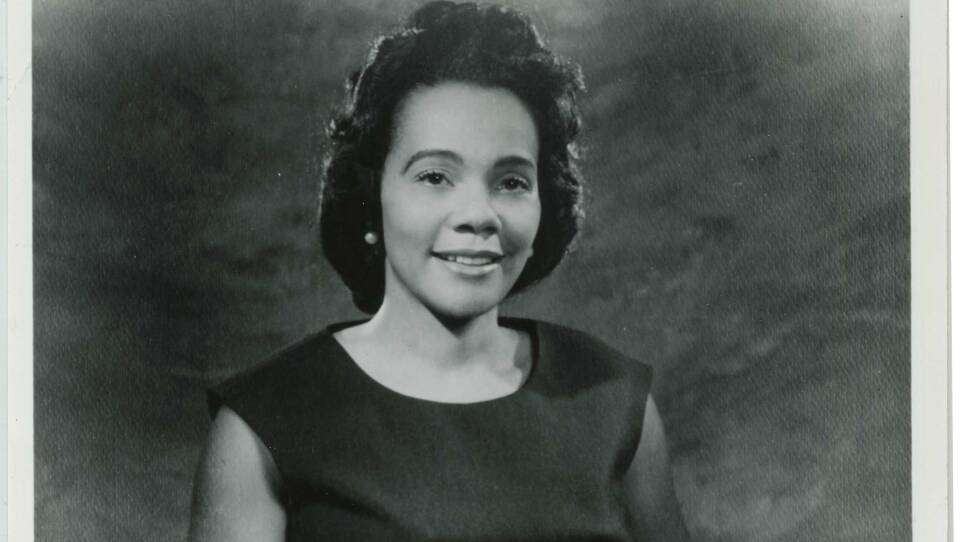Throughout her life, civil rights icon Coretta Scott King held a close relationship with the New England Conservatory. King earned her music education degree there in 1954 and would later receive an honorary doctorate in 1971. It's also where, as a student, she met her future husband, Martin Luther King Jr. On March 14, the New England Conservatory's Black Student Union will honor that connection to the civil rights activist with their annual Coretta Scott King tribute concert. The concert will feature poetry and a variety of instrumental and vocal performances as students celebrate the contributions of Black artists and artistry at the conservatory. New England Conservatory, Black Student Union member and violinist Emma Boyd spoke with GBH's All Things Considered host Arun Rath about the upcoming concert. This transcript has been lightly edited.
Rath: I laid out just the very basics, but can you tell us a bit more about Coretta Scott King's time at New England Conservatory and her connection with the school?
Boyd: Yes. So Coretta Scott King was a student here in the 1950s. Personally, I did not attend classes with her, but from what we know, she was a very wonderful student. She did her Masters at NEC and although she obtained a full scholarship, she had to work very hard outside of classes to make ends meet, to provide her own housing and food. She was really wonderful in the way that she used her musical outlook, her voice as an opera major, to explore her passion for music and activism.
Rath: I was looking at the program for this concert and it looks wonderful. There's a mix of of of some classic composers like Florence Price and some contemporary works as well. How did you go about deciding what was going to go into the concert?
Boyd: The Black Student Union is led by Lemuel Mark and I have to give him a lot of credit for the ideas about this concert. When we were discussing a theme, he mentioned how Coretta Scott King herself was breaking boundaries in the fact that she was an opera singer. And that's not really the norm for Black people, especially in the time that she was a student at NEC. We wanted to make the theme of this concert, continuing the thread and continuing the theme that being Black does not mean we are subjugated to one specific type of music. We were very expressive in our nature, and we're free to express ourselves in any way we want. So, that's why we have classical, we have jazz, we have electronic trumpet, we have poetry. We just have a lot of different types of art forms to show that we can express ourselves in many different ways.
More Music & Culture
Rath: Well, let's talk in detail about one of those pieces that you're performing in, because you play violin. You mentioned Lemuel Mark. This is a piece of his, along with Vanessa Silva, who's also in the ensemble performing it. It's called, "Collection of Thoughts and Memories."
Boyd: Yes. I'm very excited to be working on that. First of all, I am a classical violinist, so the group will be performing a free jazz sort of style, which is also not in my norm. But we are setting it to the poetry of Vanessa Silva. She's an amazing poet. I worked with her previously in a "Black is Canon" concert, which is a concert series the Black Student Union performs every month. But the poetry is very beautiful. I don't have a lot of words about the poetry at the moment, but we are very excited to be performing these works.
Rath: Talk a bit more about how you kind of had to stretch out to somebody from a classical player and you said, this is kind of free jazz like?
Boyd: Yes. So being friends with Lemuel, I've had the experience to get to know him and understand things about jazz that I really wouldn't have understood just from textbooks or going to a concert. He's really shown me a lot, especially playing in this ensemble, about how it's a very different environment where you're very reactive to everything around you. And the way that you express is not written down formally. It's more of an emotion and an energy. In the classical sense, it would be written down. You have all the notes, the music is right there in front of you. But free jazz, it's going to be different because everyone's going to be playing something a little bit different. And it's all mixed together, but the message is still the same. It's sort of like abstract art in that way.
Rath: There's another piece by Lemuel for voice and ensemble. And I can't take the time to list out all of the other musical artists involved in this. But just going off of their names, it just seems like a wonderfully cross-cultural ensemble. Am I right going off the names to say that?
Boyd: Yes, absolutely. That is something we've been really focusing on this year in the Black Student Union. We are trying to include more people and create a community that's more encompassing of the NEC class. And one way we can do that is through our performers and showing that we can be united in our performances and in real life.
Rath: That's awesome. It's inspiring as well, I have to say. This is being put on by by the by the Black Student Union, tell us a bit more about what the Black Student Union has been doing at NEC, the other initiatives and events you're involved in.
Boyd: So, one of the first things that comes to mind is the "Black is Canon" concert, which I mentioned a little bit earlier. This concert series was actually started by Lemuel, and it's just a way for us to perform and express ourselves in a less intense setting. We try to invite as many people out as we can and sometimes there will be different themes and other times we just want to play together and share our music. Other things we also enjoy are just having conversations. I'm a firm believer that conversations can really do a lot. Not every change is going to be made through big actions. I believe small actions cause a big ripple. And one way is through conversation and we'll talk about our experiences here at the conservatory, and we're kind of there for each other as Black students. We keep each other company and support each other in times of crisis.
Rath: Brilliant. Emma, it's been great speaking with you. Thank you.
Boyd: Yes, Thank you so much.
TheCoretta Scott King Tribute Concertis on March 14 at the New England Conservatory's Jordan Hall.









